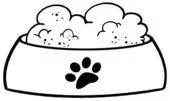Feline Nutrition

Nutrition is a very important part of maintaining a healthy feline friend. Cats are carnivores, meaning they should mostly eat protein. In fact, they are very adept at handling large loads of proteins and fats, but not so good at processing carbohydrates. If you consider the ideal diet for a cat, a mouse or bird, the only carbohydrates they would consume would be the small amount within those animals’ GI tract. This is why most dry cat foods are NOT an ideal diet, as they tend to be loaded with carbohydrates. Canned diets in general tend to have higher protein levels and therefore are more suited to meeting a cat’s nutritional needs. Unfortunately, some cats that are not exposed to canned food prior to 6 months of age will not accept canned food. Here are some tips to get your cat/kitten on the right track: feed a measured amount of food per day--do not just allow your cat to eat as much as they want whenever they want. Try canned food--the more of the diet that is composed of canned food the better. Offer smaller, more frequent meals-–cats that eat too much as once will tend to vomit food whole. Finally, separate cats when feeding--this allows you to better monitor who is eating what and also feed separate foods if necessary. An ideal diet would have >40% protein and <15% carbohydrates. This is referring to healthy felines. Cats that are suffering from a disease process may have different nutritional requirements. If you are concerned about your cat’s nutrition, call your veterinarian.
